Code: Section 164 BSA
Any writing referred to under the provisions of the two last preceding sections
shall be produced and shown to the adverse party if he requires it; such party may, if he
pleases, cross-examine the witness thereupon.
Explanation of Section 164 BSA
Section 164 of the Bharatiya Sakshya Adhiniyam (BSA) ensures that the adverse party (the opposing side in a case) has the right to examine any written document that a witness has used to refresh their memory under Sections 162 or 163. This provision safeguards the fairness of the trial by allowing the opposing party the opportunity to scrutinize the document and, if necessary, cross-examine the witness about it.
Key points of Section 164 include:
- Right to Access the Document: If a witness has referred to a document to refresh their memory, the opposing party has the right to demand that document be produced.
- Opportunity for Cross-Examination: The opposing party may cross-examine the witness regarding the document if they wish to challenge the testimony or seek clarification on the contents.
- Ensuring Fairness: This provision helps ensure that the process of refreshing memory is transparent, and prevents any unfair advantage that might arise from undisclosed or secretive reference materials.
In summary, Section 164 ensures that all relevant documentation used during testimony is accessible to the opposing party, which is a key part of maintaining a fair trial.
Illustration
Example 1: Cross-Examination of Business Record
A witness has referred to a ledger to recall certain transactions that took place six months ago. Under Section 164, the opposing party may request to see the ledger and, if necessary, cross-examine the witness regarding the transactions noted in the document.
Example 2: Expert Testimony in Court
An expert witness refers to a scientific study or report to refresh their memory on a technical issue. If the opposing party demands the document, the expert must show it to them, and they may cross-examine the witness on the accuracy or interpretation of the report.
Common Questions and Answers on Section 164 BSA
- Can the opposing party request any document a witness refers to?
- Yes, the opposing party can request any document referred to by the witness in order to refresh their memory, as stipulated under Section 164.
- Is the opposing party allowed to cross-examine the witness about the document?
- Yes, the adverse party may cross-examine the witness on the document they have referred to in order to refresh their memory.
- Does the witness have to provide the document to the opposing party?
- Yes, if the opposing party demands it, the witness must produce the document to them.
- Can the opposing party challenge the contents of the document during cross-examination?
- Yes, the opposing party can use cross-examination to challenge the contents of the document or clarify points they believe are ambiguous or inaccurate.
- Why is Section 164 important in legal proceedings?
- Section 164 ensures fairness by preventing one party from using documents to their advantage without giving the opposing side the chance to review and challenge them. This promotes transparency in the judicial process.
Conclusion
Section 164 of the Bharatiya Sakshya Adhiniyam (BSA) plays an essential role in promoting transparency and fairness in legal proceedings. By allowing the opposing party to access any document a witness has used to refresh their memory and to cross-examine the witness regarding that document, this provision safeguards the integrity of the trial. It ensures that all parties have a fair chance to scrutinize the evidence, which is crucial for upholding justice.
For more detailed insights into the Bharatiya Sakshya Adhiniyam and other related legal provisions, explore ApniLaw’s comprehensive legal resources.








